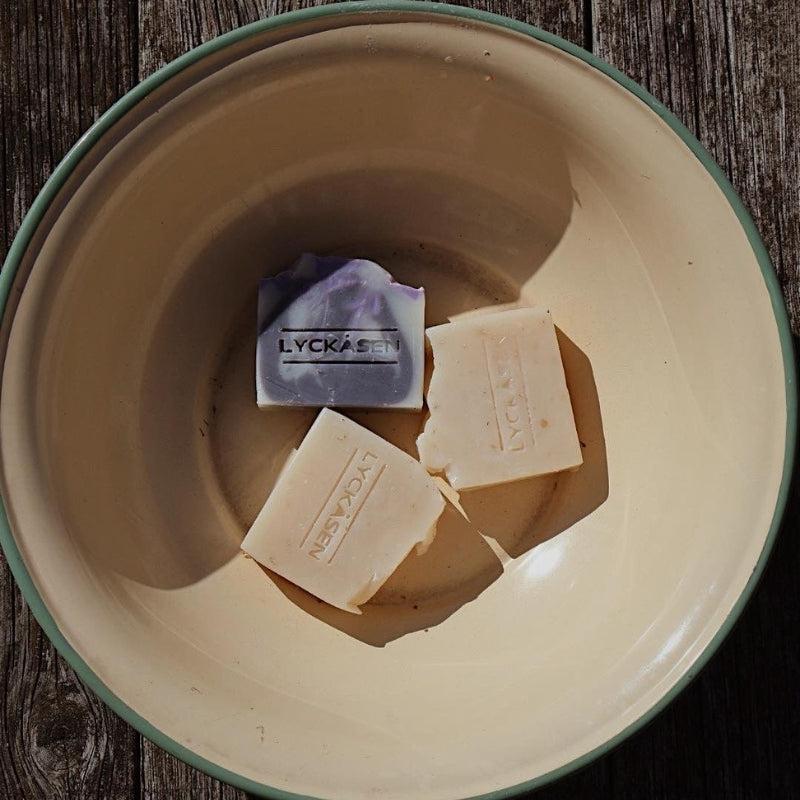
Natural Soap – Everything You Need to Know about Organic Skin Care
Share
Natural soap is more than just a cleanser – it’s a lifestyle product that both cares for your skin and is environmentally friendly. In this guide, we’ll dive into what natural soap is, what benefits it offers, and how to choose the right soap for your needs. Whether you have sensitive skin or are looking for an eco-friendly alternative, here are some valuable tips for you.
What is Natural Soap?
Natural soap is made from ingredients such as plant oils, essential oils and natural fragrances, without synthetic additives, parabens or harsh chemicals. By using traditional manufacturing methods, often cold-processed, the soap retains its natural properties and mitigates the risk of skin irritation.
Benefits of Natural Soap
Switching to natural soap can have several positive effects, both for your skin and for the environment:
- Gentle on sensitive skin: Without aggressive chemicals, the risk of irritation and allergic reactions is reduced.
- Organic and sustainable: Natural ingredients are often more environmentally friendly and break down more easily, reducing waste.
- Natural scent and feel: The essential oils provide a mild, natural scent without artificial fragrances.
- Supports small-scale producers: Many natural soaps are produced by local or artisanal businesses, which benefits the local community.
Using natural soap can therefore be a step towards both a healthier skincare routine and a more sustainable lifestyle.
How Do You Choose the Right Natural Soap?
With a wide range of natural soaps on the market, choosing the right product can feel overwhelming. Here are some tips:
- Read the ingredients list: Look for soaps that contain plant-based oils (such as coconut, olive, or almond oil) and avoid products with synthetic additives.
- Feel the soap: Natural soaps can have a firmer consistency than mass-produced varieties, which is often a sign of a cold-processed soap that retains its natural glycerine.
- Test a small amount first: If you have sensitive skin, feel free to test a small amount to see how your skin reacts.
- Look out for certifications: Eco-labels and organic certificates can be a good indicator of the quality of the product.
Click here to get to the soaps.
Tips for Using Natural Soap
To get the most out of your natural soap while preserving its properties, you can follow these simple tips:
- Store correctly: Store the soap in a dry place, preferably in a soap holder that allows excess water to drain off. This will extend the life of the product.
- Use with water: Do not wash with water that is too hot, as it can dry out the skin. Slightly lukewarm water is usually best to preserve the skin's natural moisture balance.
- Massage in well: When washing your face or body, massage the soap in circular motions to stimulate blood circulation and get a gentle exfoliation.
Try our soap dish for optimal durability.
Natural Soap and Environmental Impact
By choosing natural soap, you are also contributing to a better environment. Unlike conventional soaps, which often contain chemicals that can negatively affect aquatic organisms, natural soaps are biodegradable. This means that they break down without leaving any harmful substances in nature.
Additionally, many natural soap makers support small-scale, local businesses that embrace sustainability and ethical production methods. By making a conscious choice, you are not only affecting your own health, but also the future of our planet.
Closing Thoughts
Natural soap is an excellent choice for those who want a gentle, effective and environmentally friendly product in their daily skincare routine. With its natural ingredients and sustainable production methods, it offers a range of benefits that go far beyond traditional soap.
If you're interested in trying natural soap, we recommend starting with a product that suits your skin type. Explore the different varieties and discover how small changes in your everyday life can lead to big improvements – both for yourself and for the environment.
